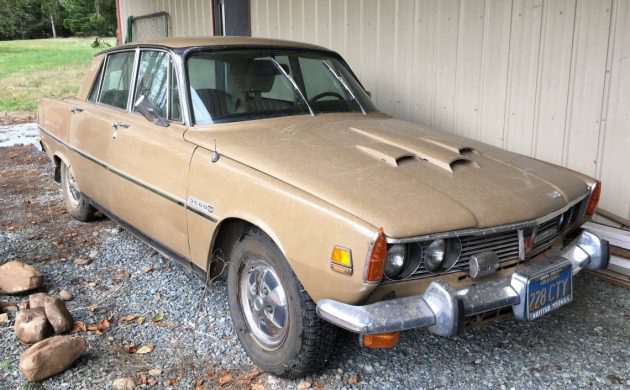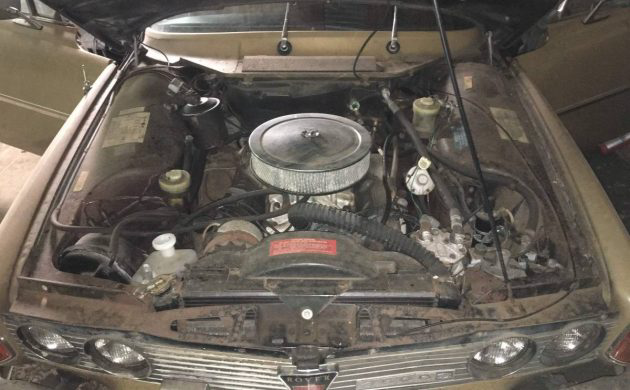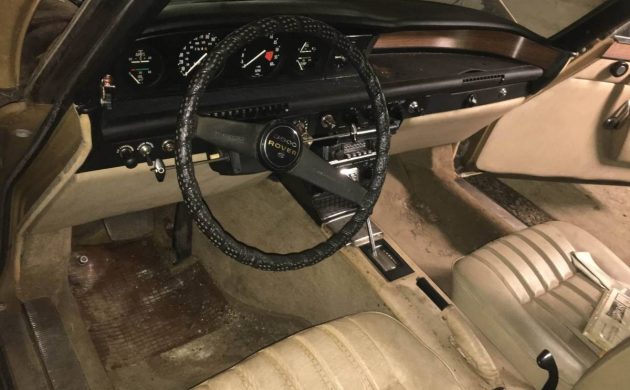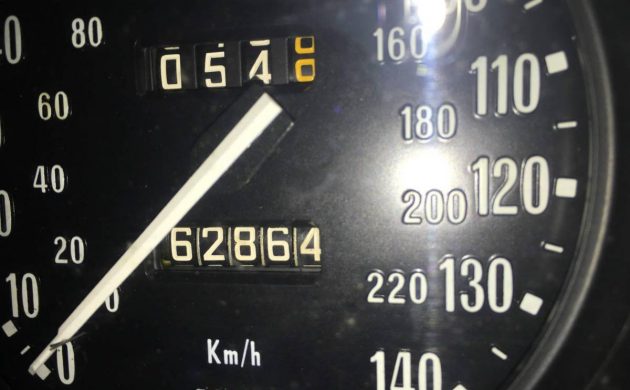Among the list of cars I would like to someday own if endless time and money ever coincide at the right moment is the V8-powered Rover 3500S sedan. This is a wonderful mash-up of stately, British styling and brutish American power. The Rover featured an aluminum V8 engine sourced from Buick, and gave drivers the benefit of solving one major aspect of fiddly British engineering. They weren’t exactly fast but the big sedan certainty got out of its own way and is a nice change of pace from the usual Mercedes-Benz models we associate with the high watermark of overseas luxury models from the 1970s. Find the Rover here on craigslist in Oregon for a mere $2,000.
Now, it’s not to say that I couldn’t justify buying this very affordable project right now, but I need another project like I need brain surgery (no wise-ass responses, please.) The Rover is said to be a one-owner vehicle and wears old-school California blue plates along with a dealer plate frame from British Motors of San Diego. Personally, I love small details like that which typically get lost to the passage of time and different owners; with those details in place, you begin to paint a picture of this Rover’s past. The car appears very complete, and the Buick-derived V8 engine looks like it’s ready to fire up with a moment’s notice; however, it does not run at present.
The interior is restrained but quite handsome. I have the benefit of knowing where three of these British/American hybrids are sitting in various junkyards around the northeast, which indicates to me they were popular in this neck of the woods when new. The interiors are much like this car, which is to say holding up surprisingly well despite years of inactivity. The seller’s car looks like it was stored indoors for some time based on the photos showing it in a dimly lit space, which has likely helped keep the sensitive dash pad and leather seating in very respectable shape. The seller claims it is a one-owner example with lots of surface rust, but that it’s still a good candidate for restoration.
Mileage is indicated as being under 63,000 on the odometer, and I’d hazard a guess that based on the condition we see inside the Rover, that could be accurate. This model didn’t come standard with the Buick-built V8, so you had to check that box when visiting your local Rover dealer. Given the California origins and the respectable paint and body panels, I’d say there’s a good car here that’s worthy of restoration and seemingly on offer for a very good price. I don’t know how messy these get with their British engineering evident in other aspects of the vehicle (i.e., electronics), but with the generally bulletproof qualities of the engine well established, I can’t see you losing your shirt on bringing this one back to life. Would you take it on for $2K?







What’s up with that “Mad Max” hood, lol
I believe the Rover V8 had a pair of SU carburetors stuck on top, which wouldn’t clear the four-cylinder version’s hood.
Those seem to have been replaced on this particular car.
I gather only the US-market version got these scoops, so I think it was more a matter of assisting engine cooling in southerly US climes than any clearance issues.
The scoops are functional and adjustable from summer to winter. The engine gets hot and in summer the currents of air really help keep the bay temperature down.
Plenty of hot places here in Australia, but we didn’t get the third hood scoop that was inflicted on the Nth American 3500s.
When I was 16 and looking for my first car one of these sat on the corner lot of a Fiat dealer. We used to pass this every time we went to visit grandparents. Must have sat there for almost a year. My dad had to give his blessing and when I inquired about the Rover he shot me down with that look of disgust that all teenage boys were familiar with. It was probably good the Rover would not be my first car. However I still desire to eat the forbidden fruit and wouldn’t mind trying the Rover experience. Fortunately I have too many irons in the fire as well.
You had a very wise father!
There was one just like this,same color too,
that a lawyer who lived in our neighborhood bought
new.Always thought it was a cool car.
When I was a kid the fellow across the street had one of these. As my friends and I grew up into car guys we took an interest in the Rover. The strangeness of the hood forgotten we liked the look of the interior. When we finally got a ride it was like sitting in my grandparent’s living room with a whisky and cigar.
While probably less wood and leather than a Jaguar saloon am guessing it would be nearly as expensive as restoring one
Dig how these somehow manage to look both classic and radical at the same time, depending on which details you focus on.
Also some pretty clever suspension engineering — a telescoping de Dion tube in the rear eliminates any need for sliding half-axle splines, and bellcranks in front engage horizontal longitudinal coil springs to maximize engine space, with shocks that extend (rather than compress) on bump to improve their longevity.
Superior ride to any Mercedes of the same era. Excellent build. Only problem the electrics.
Great price and I would buy it if I lived in the USA.
Get rid of the iffy SU’s and fit a suitably jetted quad Holley . Makes for stirring progress
Get rid of those carbs and replace with
Lots of potential here. The surface rust on the front valance is nothing. Buff and seal the paint and it would be a nice looking driver. The leather needs a good feeding but it too would look very presentable. I’ve had 2 Rovers to date a P6 with the 4 cylinder and a 3500 with this engine and a 5 speed. Agree the Bw 35 transmission is the weak link. Drain, clean the screen and fill. Oh and did I mention this has the ultra cool “ Ice Alert”
I had a ’70 one of these with similar mileage, the engine ran fine, the Borg Warner transmission was the weak link. Still a fun car to own and drive.
In the clifton park ny area there was someone who had a rover sedan in a funky dark yellow color, and when i was a kid i would see it around town once in a while, it stood out from any other 1980s and 1990s car at the time. I last saw it at a local diner parking lot 7 yrs.ago
The “sourced from Buick” statement is basically true, though no Buick manufactured engine was ever used in a Rover. Rover bought the rights to the “215” all alloy V8 after Buick had effectively abandoned it in the 1950s. I recall reading that the reason Buick gave up on the 215 was a combination of politics/union opposition to the switch from cast iron casting to all aluminum, and the fact that new thin-wall techniques were being introduced for cast-iron blocks which allowed them to be made lighter – reducing the advantages of the more expensive aluminum option? I don’t know if any Buick historians on this site could elaborate on that story?
The story with Rover is that apparently a senior Rover exec was over in the US and actually at Mercury marine, saw an example of the 215 motor sitting around and asked what it was. The compact lightweight V8 was perfect for what Rover wanted so they licensed it from Buick. Rover then did some pretty substantial development work on the engine – they even contracted a senior Buick engineer who was about to retire, and took him over to the UK as a consultant to work on it – so the original 215 and the Rover “3.5” V8 are different in a lot of details. It was first used in the Rover “P5” sedans where it was substantially lighter and more powerful than the rather antique straight six “inlet over exhaust” engine it was replacing.
That Rover version of that V8 went on to be very successful and was used for many years in Rovers, Land Rover, Morgan plus 8, MGB V8, Triumph TR8, Marcos, TVR ( they developed it out to a 5.0 version that made over 300 bhp) Lotus Esprit and probably a few others…
as someone already commented…the hood with the three scoops is unique to NA market cars. it wasn’t required to clear the carb tops, as the rest-of-the world V8s had a flat hood.
When this model “Rover 2000” launched in 1963 it was quite a hit in UK and Europe. It was really a technologically advance car with all-round disk brakes, sophisticated suspension and safety features. originally only available with a 2,000 4-cylinder which was a brand new OHC design but a little underwhelming in performance. The 4-cylinder motor was later bumped up to 2,200 which helped some, but the addition of the 3.5 V8 made this car a real cruiser.
One other little quirk of the Rover 2000 design was that the engine bay is especially large and wide because they were intending that the car might house a gas turbine power unit, which Rover (like Chrysler) had been developing through the 1950s. In the end (also, like Chrysler) they just couldn’t make the gas turbine work for road car use and they had to give up on it. …which made dropping the V8 into that engine bay relatively easy….
Correct me if I’m wrong but I believe all the body panels bolted on, including the roof. They had an ad stating that for X number of dollars you could purchase panels in a different color should you want to do so. That couldn’t be cheap.
Not only that, but despite being unibody/monocoque construction, none of the external body panels are structural; you could remove all of them, even the roof, and still have an intact and drivable (albeit breezy!) car.
I never saw so many Rover automobiles until I moved to Oregon 36 years ago! They were not at all uncommon but this one’s coastal location means the rust is probably far more severe than the seller is letting on. I would view it as a parts donor for that aluminum V8 if I had any interest, but I don’t
Dreadful rotboxes!
Great looking car with performance to rival BMW. But could only seat 4 while others could squeeze in 5. The trunk (boot) was so small a kit was made to mount the spare on the lid.
No SUs on this one. Looks like someone has already done a 4 or 2 barrel conversion. There was one of these on “Wheeler Dealers” some time ago.
I wouldn’t call the 215 brutish. 161 HP, 0 to 60….9 seconds, 122 mph top speed. I have one in my TR8.
I had one from 1988 to 1996. It was a 50,000 mile survivor and was in excellent shape. I didn’t drive it much, but when I did the ammeter loved to show a discharge condition, so I’d open the glovebox and give the regulator a good whack and all would be well until next time. I loved to take it out and just watch people stare at it. I sold it to a guy who was going to ship it back to England and convert it to RHD, as rust free examples like mine were scarce.